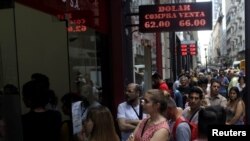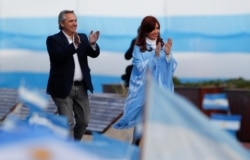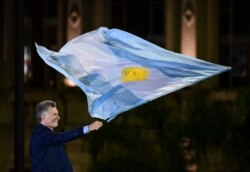Argentina's central bank kept selling dollars in defense of the crumbling peso on Friday, as concern increased over the bank's falling reserves ahead of Sunday's presidential election dreaded by the financial markets.
With the upcoming vote increasing jitters about the recession- and inflation-racked economy, money changers on the streets of Buenos Aires squeezed the currency 7.6% lower to 75.5 per U.S. dollar on the black market, extending losses for the week to 13.6%.
The formal peso, supported by the central bank, fell 0.3% to 59.99 versus the greenback, having weakened 24.4% over 11 weeks since the shock result of the country's presidential primary dumped cold water on the markets.
The bank spent $220 million on interventions on Friday, traders said, as the peso continued its four-year swoon under President Mauricio Macri, a free-markets advocate and Wall Street darling expected to lose his re-election bid on Sunday.
The bank has shed $21 billion in reserves since the August primary, when Macri was dealt a surprisingly severe beating by his Peronist challenger Alberto Fernandez.
Reserves were at $45.26 billion on Friday as markets worried about a resurgence of government intervention in the economy under a Fernandez administration.
"My sense is that he will announce more strict capital controls from day one, because the reserve level is very low," said Alberto Bernal, chief emerging markets strategist at XP Investments in New York.
The country has a $57 billion loan deal with the International Monetary Fund, which has said it will evaluate its relationship with Argentina once the next government's policies are announced.
Fernandez's selection of former president and populist icon Cristina Fernandez de Kirchner as his vice presidential candidate has also unnerved investors.
"Alberto needs to make sure that Cristina stops talking about economic policy, because every time she speaks, the market and savers freak out. Fernandez will have very little time to deliver a coherent plan that the markets and the IMF can endorse," Bernal said.
Macri was elected on promises of "normalizing" an economy distorted by Fernandez de Kirchner's heavy-handed trade and currency controls. But he overestimated his ability to attract investment and underestimated the inflationary impact of his fiscal policies.
These included cuts in public utility subsidies that boosted electricity and heating bills for businesses, which in turn hiked prices for the goods and services they sold. Inflation took off and has yet to moderate. Consumer prices rose 5.9% in September alone.







